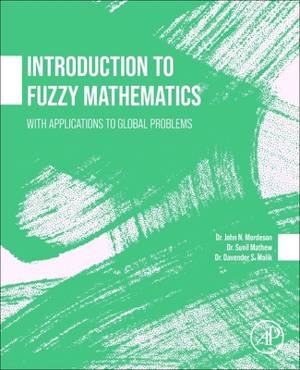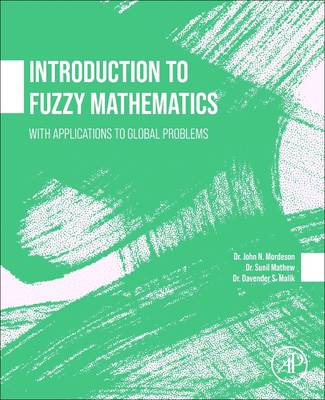
- Retrait gratuit dans votre magasin Club
- 7.000.000 titres dans notre catalogue
- Payer en toute sécurité
- Toujours un magasin près de chez vous
- Retrait gratuit dans votre magasin Club
- 7.000.0000 titres dans notre catalogue
- Payer en toute sécurité
- Toujours un magasin près de chez vous
Introduction to Fuzzy Mathematics
With Applications to Global Problems
John Mordeson, Davender S Malik, Sunil Mathew
Livre broché | Anglais
169,95 €
+ 339 points
Description
Delve into the intricate landscape of fuzzy mathematics, where the boundaries of traditional mathematical disciplines--analysis, abstract algebra, geometry, topology, and graph theory--are blurred to address pressing global issues. Through a rigorous examination of fuzzy sets and similarity measures, Introduction to Fuzzy Mathematics: With Applications to Global Problems lays the groundwork for innovative solutions to complex problems, from medical diagnostics to sustainability, refugee crises and the fight against human trafficking. Meanwhile, research projects and exercises integrated across chapters reinforce learning and apply fuzzy mathematics to real-world scenarios. Chapters are meticulously organized to guide readers through foundational concepts, including fuzzy sets, evidence theory, and implication operators, before advancing to applications in sustainability and climate change. Further, the book examines refugee dynamics and public health models, culminating in a thorough exploration of fuzzy algebraic structures, geometry, topology, and graph theory. This comprehensive resource not only enhances understanding of fuzzy mathematics but also equips readers--researchers, practitioners, and policymakers alike--with the tools to tackle critical global issues. By integrating mathematical rigor with real-life applications, the book serves as a vital reference for anyone seeking to navigate the complexities of our world through the lens of fuzzy mathematics.
Spécifications
Parties prenantes
- Auteur(s) :
- Editeur:
Contenu
- Nombre de pages :
- 250
- Langue:
- Anglais
Caractéristiques
- EAN:
- 9780443440977
- Date de parution :
- 01-03-26
- Format:
- Livre broché
- Format numérique:
- Trade paperback (VS)
- Dimensions :
- 190 mm x 235 mm
- Poids :
- 449 g

Les avis
Nous publions uniquement les avis qui respectent les conditions requises. Consultez nos conditions pour les avis.






